UNBC recognizes seven distinguished Professors Emeriti
Members of the University community gathered for a special ceremony to honour seven retiring faculty members, celebrating their remarkable accomplishments and the lasting impact they have made on UNBC and beyond.
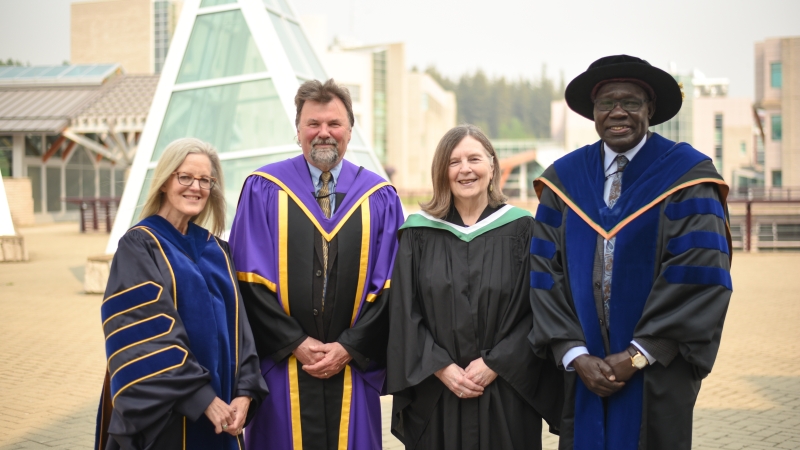
The University of Northern British Columbia celebrated seven distinguished Professors Emeriti at a Faculty Recognition Event on May 16.
Dr. Paul Bowles (Global & International Studies, Economics); Dr. Gail Fondahl (Geography, Earth & Environmental Sciences); Dr. Art Fredeen (Ecosystem Science and Management); Professor Dawn Hemingway (Social Work); Dr. Martha MacLeod (Nursing); Dr. Fiona MacPhail (Economics); and Dr. Chris Opio (Ecosystem Science Management) were awarded the honorary title “Professor Emeritus/Emerita” during the special gathering and will join the platform party for the 2023 Convocation ceremony.
The seven Professors Emeriti have retired, or are retiring this year, and are being acknowledged and honoured for their exceptional service to the University and to the larger academic community.
BACKGROUNDER
Dr. Paul Bowles (Global & International Studies/Economics)
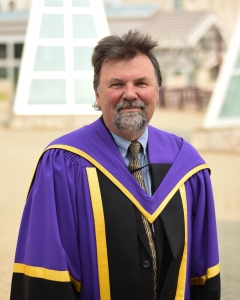 Dr. Paul Bowles has demonstrated outstanding commitment to UNBC for almost 30 years. He is a founding faculty member and arrived as one of the first cohort of 32 faculty in 1993. He was the 100th employee of the University and in 1994 was appointed as the founding Chair of the Department of Economics.
Dr. Paul Bowles has demonstrated outstanding commitment to UNBC for almost 30 years. He is a founding faculty member and arrived as one of the first cohort of 32 faculty in 1993. He was the 100th employee of the University and in 1994 was appointed as the founding Chair of the Department of Economics.
An accomplished researcher, Dr. Bowles is the author or editor of 11 books and more than 100 journal articles and book chapters. He has written extensively on globalization, development, China’s political economy and, closer to home, the economic development of northern B.C. He held the prestigious Fulbright Canada Research Chair at the University of California, Santa Barbara and has received many external research grants including from the Social Sciences and Humanities Research Council, the International Development Research Centre and the Nordic Council of Ministers.
Dr. Bowles has also represented UNBC externally, most notably being appointed by Order-in-Council for a term on the BC Council of Economic Forecasters, providing evidence before the Senate Committee on Foreign Affairs on his work on China, serving his discipline as President of the Canadian Association of International Development Studies, and serving as elected President of the Confederation of University Faculty Associations of British Columbia.
He has taught across all levels of instruction in two departments, has been involved in the supervisory committees of more than 30 graduate students and has involved many students in his research projects.
Dr. Bowles has served a total of 14.5 years as Chair for either the Department of Economics or the Department of Global and International Studies. During his terms as Chair, he led initial curriculum design for both undergraduate and graduate programs, spearheaded subsequent curriculum revisions, and mentored many junior faculty. Among other highlights of his service record at UNBC, he was a Faculty Member on UNBC’s first Senate, served as Grievance Officer for the Faculty Association, and initiated the Global Friday speaker series, now in its 15th year and a fixture in UNBC’s internationalization efforts.
Dr. Bowles will retire in December 2023.
“UNBC is all about relationships and connections; being able to keep a connection through Emeritus status is important to me.”
Dr. Gail Fondahl (Geography, Earth & Environmental Sciences)
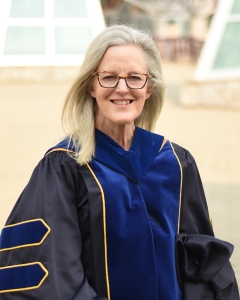 Dr. Gail Fondahl is an exceptional researcher, scholar, and teacher. She is one of Canada’s leading experts on northern and Arctic studies and worked extensively in the Soviet Union and Russia for four decades. Dr. Fondahl received the UNBC Excellence in Research Award in 2019, the UNBC Northern Resources and Environmental Studies Institute Lifetime Achievement Award in April 2022 and the Lifetime Honorary Membership Award from the International Arctic Social Science Association. She served as Vice-President, Research at UNBC from 2008 to 2012.
Dr. Gail Fondahl is an exceptional researcher, scholar, and teacher. She is one of Canada’s leading experts on northern and Arctic studies and worked extensively in the Soviet Union and Russia for four decades. Dr. Fondahl received the UNBC Excellence in Research Award in 2019, the UNBC Northern Resources and Environmental Studies Institute Lifetime Achievement Award in April 2022 and the Lifetime Honorary Membership Award from the International Arctic Social Science Association. She served as Vice-President, Research at UNBC from 2008 to 2012.
Her 2004-2008 UNBC -Tl'azt'en Community-University Research Alliances (CURA) project Partnering for Sustainable Resource Management, funded by the Social Sciences and Humanities Research Council (SSHRC), was one of the first true research partnerships between a First Nation and a university in Canada. Co-led by UNBC and the Tl'azt'en Nation in northern British Columbia, the project focused on culturally and ecologically sustainable natural resource management. Key to its success was the involvement of many Tl'azt'en community members and training and research experience for the First Nations partners as well as many undergraduate and graduate students. The project incorporated outreach work to enhance science curricula for Tl'azt'en youth, and respectfully involved Elders and traditional knowledge holders.
Critical projects of the CURA alliance included improving the co-management partnership between UNBC and the Tl'azt'en Nation around the John Prince Research Forest; developing the methods and practices for recording traditional Tl'azt'en Nation ecological and cultural knowledge and ways to transmit that knowledge across generations; creating innovative environmental educational programming based on an alliance of traditional ecological knowledge and scientific knowledge; and supporting research and community dialogue around the Tl'azt'en Nation’s ecotourism initiatives.
Dr. Fondahl has made significant contributions to research on Arctic sustainability and development. She has demonstrated leadership on a number of important international committees and organizations in the area of Arctic affairs and diplomacy. Dr. Fondahl served as the Canadian representative and Vice-Chair of the Social and Human Sciences Working Group of the International Arctic Science Committee, and the Co-Chair of the Social, Economic and Cultural Expert Group of the Arctic Council’s Sustainable Development Working Group. From 2011- 2014, she served as President of the International Arctic Social Sciences Association.
As a result of Dr. Fondahl’s four decades of extensive research in the Soviet Union and Russia, she has become a respected authority on Indigenous and northern studies in Russia. It is worth noting that her early research was taking place when it was still difficult to access the Soviet Union but once opportunities were created, Dr. Fondahl was among the first foreign researchers on the ground and in the field. Since those early years as a graduate student, Dr. Fondahl has developed long and sustained relationships with people, organizations and communities across Eastern Siberia. Her first book Gaining Ground?: Evenkis, Land and Reform in southeastern Siberia is a masterful exploration of complex issues surrounding the many processes of change impacting the region and employs several innovative tools for communicating the implications for both communities and people.
Since it was published in 1988, Dr. Fondahl has kept up a significant research and publication record documenting the transformation of the region through social, ecological, and especially political change. Importantly, her work has tracked the transition from the Soviet Union into the Russian state, as well as transformations from the early years of that reformed state to its current context. Her most recent SSHRC-funded research visits have again provided an opportunity to update the impact of changing social, environmental, and political transformations. In many ways, she has been the international chronicler of the profound changes being experienced by the Indigenous peoples of Eastern Siberia.
Dr. Fondahl has worked with many students, imparting a commitment to fieldwork, academic presentation excellence, and publication strategies. Dr. Fondahl has demonstrated intellectual rigour, boundless energy, and commitment to her research, to the Department of Geography, Earth & Environmental Sciences and UNBC students.
Dr. Fondahl retired in June 2022.
Art Fredeen (Ecosystem Science and Management)
 Dr. Art Fredeen is a founding faculty member of UNBC, appointed to the Forestry/Biology program in January 1995. Over the 27 years spent at UNBC, Dr. Fredeen has taught more than 10 different undergraduate courses in Biology, Natural Resources Management, Forestry, Environmental Studies and Environmental Science. He was an important contributor and developer of foundational courses in UNBC’s Natural Resources and Environmental Studies (NRES) graduate programs. He has supervised many undergraduate projects, theses, independent studies, and 17 graduate students.
Dr. Art Fredeen is a founding faculty member of UNBC, appointed to the Forestry/Biology program in January 1995. Over the 27 years spent at UNBC, Dr. Fredeen has taught more than 10 different undergraduate courses in Biology, Natural Resources Management, Forestry, Environmental Studies and Environmental Science. He was an important contributor and developer of foundational courses in UNBC’s Natural Resources and Environmental Studies (NRES) graduate programs. He has supervised many undergraduate projects, theses, independent studies, and 17 graduate students.
Dr. Fredeen is a well-established researcher, with more than 75 peer-reviewed journal articles, published conference proceedings, peer-reviewed book chapters, major technical reports and has been invited to present his research on more than 40 occasions. He continues to publish and present his research, and remains an active collaborator with many of the faculty.
Dr. Fredeen’s research on carbon storage and carbon dioxide in B.C.’s forests, and their resiliency to climate change and mountain pine beetle, secured nearly $4 million in funding and contracts to the University during his career. His research expanded to cumulative impacts of natural resource extraction in northern ecosystems, working actively with the Health Research, Community Development and NRES Institutes on quantitative links between cumulative environmental impacts and human health metrics. Dr. Fredeen was also active in service to UNBC, serving on innumerable committees and UNBC’s Senate.
Most notable was his years of service with the NRES Institute, serving as the Director of the institute from 2019 to his retirement, and as the editor and developer of the NRES Institute publication series, with more than 20 Occasional Papers, Research Extension Notes and Technical Reports published from institute members. Dr. Fredeen was also one of the original champions for, and a serving member of, the Green University Planning Committee from its inception in 2008 until his retirement. For his dedication, he received the College of Science and Management Service Award in 2014.
Dr. Fredeen retired in July 2022.
Dawn Hemingway (Social Work)
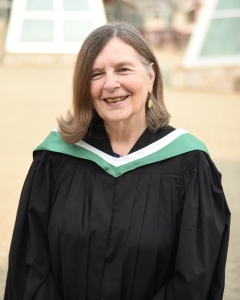 Professor Dawn Hemingway began her academic journey at UNBC in 1998 when she completed a Master of Science in Psychology followed by a Master of Social Work in 2000. She earned a tenure-track appointment in 2002 that was marked by distinguished contributions to the discipline of social work and to UNBC as a researcher, author, professor, administrator, influential social activist, and mentor. She served as the Chair of the School of Social Work for 14 years until 2019, where she provided leadership to many initiatives. She was instrumental in leading two significant national accreditation processes for the Bachelor of Social Work and Master of Social Work programs; each was granted the highest level of accreditation.
Professor Dawn Hemingway began her academic journey at UNBC in 1998 when she completed a Master of Science in Psychology followed by a Master of Social Work in 2000. She earned a tenure-track appointment in 2002 that was marked by distinguished contributions to the discipline of social work and to UNBC as a researcher, author, professor, administrator, influential social activist, and mentor. She served as the Chair of the School of Social Work for 14 years until 2019, where she provided leadership to many initiatives. She was instrumental in leading two significant national accreditation processes for the Bachelor of Social Work and Master of Social Work programs; each was granted the highest level of accreditation.
Professor Hemingway has a stellar reputation as an educator, scholar, and advocate in the areas of aging, health, and quality of life (especially for women and older adults) and community-based policy development and social change. Her publication record is extensive: 28 journal articles and book chapters; more than 130 conference presentations including 20 international presentations; more than 90 non-peer reviewed publications; and nearly 200 invited guest presentations.
Professor Hemingway has a proven, solid, successful teaching record. She developed more than a dozen different courses and is highly regarded with respect to her preparation, professionalism, and ability to link theory to policy and practice. She supervised 38 graduate students and has served as a supervisory committee member or external examiner for more than 60 additional graduate students. Many of these graduate students can now be seen in essential frontline and leadership roles in communities across northern B.C. and beyond.
Professor Hemingway continues as an Adjunct Professor at the School of Social Work, Women/Gender Studies, and Health Sciences, and continues to be a prominent member with the Leadership Council of the UNBC-based Northern Feminist Institute for Research and Evaluation/Women North Network.
She was awarded the UNBC Excellence in Service Award in 2014 and 2019, which attest to her substantial contributions, coupled with her remarkable service to the University, scholarship, the profession of social work, social activism, and her commitment to change. Professor Hemingway has held numerous appointments at the local, regional, provincial, and national level. Her unwavering commitment and devotion afforded her the opportunities to make critical contributions to laws, policies, and procedures.
Professor Hemingway retired in June 2022.
“It’s an incredible honour to become Professor Emerita at any university but especially at UNBC – a University borne of community activism with thousands of northern BC residents signing a petition and donating $5 advocating for a northern university. And that history continues to be reflected in the outstanding work and commitment of everyone at UNBC today – joining with community members across the north to create a healthy natural and social environment for everyone. We are a powerful force for a better world!”
Martha MacLeod (Nursing)
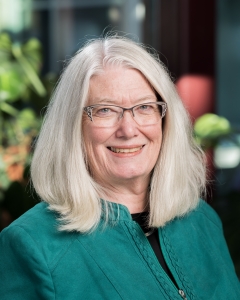 Dr. Martha MacLeod has not only made outstanding contributions to UNBC; she is recognized provincially, nationally, and internationally for her leadership and contributions to the fields of nursing practice, knowledge mobilization, rural health, and nursing education.
Dr. Martha MacLeod has not only made outstanding contributions to UNBC; she is recognized provincially, nationally, and internationally for her leadership and contributions to the fields of nursing practice, knowledge mobilization, rural health, and nursing education.
Dr. MacLeod fosters an enduring legacy of capacity-building. As a founding faculty member in the School of Nursing, cross-appointed to Community Health Sciences, Dr. MacLeod led a number of practice-driven approaches to nursing education, including the creation of the Northern Collaborative Baccalaureate Nursing Program in partnership with the College of New Caledonia and Northwest Community College (now Coast Mountain College), the Rural Nursing Certificate Program, and three pathways for Master of Science in Nursing degrees: thesis, project, and family nurse practitioner.
Her leadership and involvement with organizations such as the Canadian Institutes of Health Research, the Canadian Institute for Health Information, the Michael Smith Foundation for Health Research (now Health Research BC), the Canadian Rural Health Research Society, the BC SUPPORT Unit and the UNBC Health Research Institute (HRI) have enhanced linkages and quality within nursing education, research, and practice. Dr. MacLeod’s work to support the partnership between Northern Health and UNBC is notable and sustained, through many avenues but particularly through co-leading the HRI.
Dr. MacLeod has been a full professor since 2008 and was Chair of the School of Nursing for more than 12 years (1995-2000 and Sept 2009-June 2016). She has supervised many of the current faculty within the School of Nursing including at the doctorate and post-doctorate levels. Further, she has served as a faculty mentor to the majority of past and current faculty in the School of Nursing, where all have benefited from her skill in demonstrating how to integrate education, practice, and research. She has led curriculum development, most notably through the Rural Nursing Certificate Program, which continues to support nursing education pathways for registered nurses in both B.C. and Alberta. Dr. MacLeod has led accreditation processes that have strengthened the School of Nursing and in 2022 was recognized for the breadth of her work in education through induction as a Fellow to the Canadian Nurse Educator Institute.
Dr. MacLeod’s research has been taken up nationally and internationally, and she co-led the first and only two national studies of rural nursing practice. The publications and fact sheets from these studies inform workforce planning and influence policy and practice within B.C. and beyond.
The cumulative impact of Dr. MacLeod’s scholarly achievements is significant for nurses engaged in qualitative rural nursing research. Her work has been recognized by the College of Registered Nurses of British Columbia and UNBC with awards in research excellence and mentorship. In 2022, she was inducted as a Fellow into the Canadian Academy of Nursing.
Dr. MacLeod retired in June 2022.
“I’m thrilled to receive this honorary title. The role of Professor Emerita reflects my strong commitment to UNBC and its mission that began in 1994 and that continues, unabated. It is so pleasing and humbling to be held in high regard by colleagues about making a difference to students, to nursing and health care in northern BC.”
Dr. Fiona MacPhail (Economics)
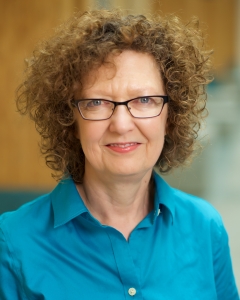 Dr. Fiona MacPhail, a dedicated founding faculty member, has been at UNBC for almost 30 years, achieving the rank of Professor in 2011. She is a productive researcher with a national and international reputation, known as a scholar of feminist economics using empirical approaches to advance understandings of work, time-use and public policy in Canada and other countries. Dr. MacPhail also contributes expertise in resource extraction and economic development in northern B.C.
Dr. Fiona MacPhail, a dedicated founding faculty member, has been at UNBC for almost 30 years, achieving the rank of Professor in 2011. She is a productive researcher with a national and international reputation, known as a scholar of feminist economics using empirical approaches to advance understandings of work, time-use and public policy in Canada and other countries. Dr. MacPhail also contributes expertise in resource extraction and economic development in northern B.C.
Her research has been recognized as advancing the discipline of economics, as demonstrated by the publication of chapters in international handbooks and books. In addition, several international agencies and a Government of British Columbia Commission have sought her expertise and commissioned reports relating to gender, labour markets, decent work that is productive and delivers a fair income and public policies. Further, she has obtained research grants, funded student research, and earned awards for her research.
Dr. MacPhail has consistently contributed her expertise in service to the University, profession and the community. She has served as the Chair of Economics for several terms over a span of seven years and was involved in curriculum design for both the undergraduate and graduate programs. Dr. MacPhail has also served a term as Academic Director of the UNBC-Statistics Canada Research Data Centre, as Acting Dean for Graduate Programs and as Co-Director of the Michael Smith Rural and Remote Health Research Network. She has been involved in the Faculty Association and served on various University committees. At the community level, she has served a variety of organizations, including the City of Prince George and the BC Centre for Employment Excellence.
Dr. MacPhail has made substantial contributions to the scholarly community through her work as a book review editor for a journal, co-editor for a special issue of a journal, section editor for a Springer Encyclopedia, and providing ongoing manuscript reviews for various journals. Her service to professional bodies is also of note and includes being President of the Canadian Association for the Study of International Development and member of a journal’s international advisory board, reviewer for another University’s departmental review, external examiner for PhD theses at other universities, and external assessor for multiple tenure and promotion applications at other universities.
Dr. MacPhail also has a successful teaching record. She has taught across all levels and been involved in graduate supervision in Economics and International Studies, where she incorporated pluralist perspectives, key contemporary issues, and active learning opportunities for students.
Dr. MacPhail will retire in December 2023.
"I am honoured to become a UNBC Professor Emerita. I am delighted to have an ongoing professional connection with the University which has provided me a vibrant and engaging academic environment for 30 years."
Dr. Chris Opio (Ecosystem Science and Management)
 Dr. Chris Opio has distinguished himself as a leader and true humanitarian in both his service and research.
Dr. Chris Opio has distinguished himself as a leader and true humanitarian in both his service and research.
Dr. Opio is a founding faculty member of UNBC, appointed into the Forestry program in 1995. Over the 27 years spent at UNBC, Dr. Opio taught more than 10 different undergraduate courses in Biology, Natural Resources Management, and Forestry. He has also taught several key courses at the graduate level, including Natural Resources and Environmental Studies classes on topics including integrated resource management, forest systems and management, and integrated environmental systems—the first course within the department’s PhD program.
Dr. Opio has supervised more than 30 undergraduate projects, theses and independent studies, and 15 graduate students.
Dr. Opio has combined research and service in his quest to bring clean drinking water to communities in Africa. In 2007, he established the Northern Uganda Development Fund (NUDF) and the group has built more than 100 wells since its inception and continues to educate communities on water testing and treatment. As NUDF’s founding director, Dr. Opio has published or submitted 24 peer-reviewed publications on various aspects of water quality assessment, community development or agroforestry and community development in Africa.
Dr. Opio has been recognized locally (Special Certificate of Recognition, City of Prince George – 2011), Provincially (CUFA BC Academic of the Year – 2014), Nationally (CBC Television’s Champions of Change – 2009), and internationally (Certificate of Requisite Residence, Oxford University Round Table – 2014) for positive research that affects the betterment of humanity.
During the 27 years that Dr. Opio has been a faculty member at UNBC, he could always be counted on to undertake whichever service or course assignments were needed by the Department of Ecosystem and Science Management. He has distinguished himself as a leader and true humanitarian.
Dr. Opio retired in July 2022.
“It is an honour and privilege to be receiving the honorary title of Professor Emeritus from UNBC. This recognition is an affirmation of my 27 years of hard work, strong work ethic, perseverance, and commitment to teaching, research, and service at UNBC. It is also an acknowledgement of my several years of service to the local and international community.”
